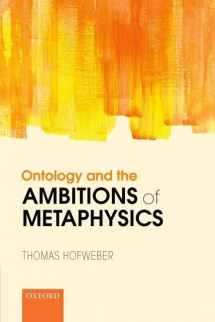
Ontology and the Ambitions of Metaphysics
ISBN-13:
9780198802235
ISBN-10:
0198802234
Edition:
Reprint
Author:
Thomas Hofweber
Publication date:
2018
Publisher:
Oxford University Press
Format:
Paperback
382 pages
FREE US shipping
Book details
ISBN-13:
9780198802235
ISBN-10:
0198802234
Edition:
Reprint
Author:
Thomas Hofweber
Publication date:
2018
Publisher:
Oxford University Press
Format:
Paperback
382 pages
Summary
Ontology and the Ambitions of Metaphysics (ISBN-13: 9780198802235 and ISBN-10: 0198802234), written by authors
Thomas Hofweber, was published by Oxford University Press in 2018.
With an overall rating of 4.0 stars, it's a notable title among other
books. You can easily purchase or rent Ontology and the Ambitions of Metaphysics (Paperback) from BooksRun,
along with many other new and used
books
and textbooks.
And, if you're looking to sell your copy, our current buyback offer is $0.3.
Description
Many significant problems in metaphysics are tied to ontological questions, but ontology and its relation to larger questions in metaphysics give rise to a series of puzzles that suggest that we don't fully understand what ontology is supposed to do, nor what ambitions metaphysics can have for finding out about what the world is like. Thomas Hofweber aims to solve these puzzles about ontology and consequently to make progress on four central metaphysical problems: the philosophy of arithmetic, the metaphysics of ordinary objects, the problem of universals, and the question whether reality is independent of us. Crucial parts of the proposed solution include considerations about quantification and its relationship to ontology, the place of reference in natural languages, the possibility of ineffable facts, the extent of empirical evidence in metaphysics, and whether metaphysics can properly be esoteric.Overall, Hofweber defends a rationalist account of arithmetic, an empiricist picture in the philosophy of ordinary objects, a restricted from of nominalism, and realism about reality, understood as all there is, but idealism about reality, understood as all that is the case. He defends metaphysics as having some questions of fact that are distinctly its own, with a limited form of autonomy from other parts of inquiry, but rejects several metaphysical projects and approaches as being based on a mistake.


We would LOVE it if you could help us and other readers by reviewing the book
Book review

Congratulations! We have received your book review.
{user}
{createdAt}
by {truncated_author}


